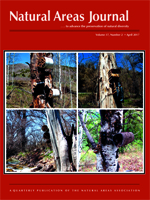A significant portion of world food supply depends on the action of pollinators, which for most crops are primarily domesticated and “wild” bees. Over 75% of pollinator value in the USA accrues through the actions of domesticated honey bees. However, the number of commercial honey bee colonies in the USA has been declining for seven decades due to parasitic arthropods, diseases, and various stresses. The recognition that honey bees, and the crops they service, are vulnerable has accelerated the search for alternative species of bees for pollination of selected crops. Foremost among potential alternatives are native solitary species such as Osmia lignaria propinqua, the “Blue Orchard Bee” (BOB), whose use as a pollinator of almonds, cherries, and apples is increasing. The BOB occurs on public lands managed by the USDA Forest Service, and the USDI Bureau of Land Management and National Park Service. BOBs are targets of “trappers” who place mostly unauthorized “trap-nests” of various designs on public lands. Several problems result from this “Tragedy of the Commons” situation: (1) the unsupervised removal of target bee species from their role in maintaining healthy ecosystems as pollinators of native plants; (2) the removal, as bycatch, of many nontarget species of bees and wasps that also employ trap-nests to rear their progeny; and (3) the shipping of these bees into areas where they do not occur naturally. We argue that unauthorized trap-nesting on public lands should be prohibited and offer several proposals to legalize commercial trap-nesting at a reduced level.
How to translate text using browser tools
1 April 2017
Bee-Rustling on the Range: Trap-Nesting for Pollinators on Public Lands
V. J. Tepedino,
Dale Nielson
ACCESS THE FULL ARTICLE

Natural Areas Journal
Vol. 37 • No. 2
April 2017
Vol. 37 • No. 2
April 2017
crop pollination
illegal trap-nesting
Solitary bees
sustainable ecosystem management
Tragedy of the commons




